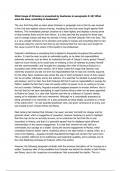What image of Octavian is presented by Suetonius in paragraphs 9-18? What
were his aims, according to Suetonius?
The very first thing that we learn about Octavian in paragraph nine is that he was involved
in five civil wars against various enemies, including the two that were fought against Mark
Anthony. This immediately portrays Octavian as a keen fighter, and displays a strong sense
of duty towards Rome and his own faction. It is also said that the purpose for these wars
was ‘to avenge Caesar and keep his decrees in force’, and that Octavian ‘felt it his duty.’ This
is a very outright reference to his devotion and loyalty to Caesar and everything that he had
previously stood for, and the fact that we are informed that five civil wars were fought for
this cause is proof of the extent of this loyalty to his predecessor.
Octavian’s dutifulness is something that is alluded to frequently throughout this particular
section. It could be seen as quite an admirable quality, as he takes his responsibilities
extremely seriously, such as when he undertook the task of Caesar’s victory games ‘himself’,
‘spent as much money as he could raise on enlisting a force of veterans to protect himself
and the commonwealth’, and ‘brought the campaign [the relief of Decimus Brutus] to a
successful close within three months.’ All of these create the image that Octavian was
extremely proactive and did not shirk his responsibilities that he had only recently acquired.
On the other hand, Suetonius also shows the way in which Octavian’s sense of duty caused
him to act rather ruthlessly and to the extreme. It is said that ‘he decided to punish Brutus
and Cassius’, and it is clear here that Octavian felt that it was his responsibility to avenge his
‘father’, despite the fact that it was not exactly within his power to do so, seeing as he was
not yet a senator. Similarly, ‘Augustus actually engaged assassins to murder Anthony’ due to
the fact that he had been attempting to expel Decimus Brutus when he had been appointed
at Mutina by Caesar. It is clear that Octavian saw this as a defiance of Caesar’s wishes,
seeing as he retaliated with such resentment. Although he is undoubtedly presented as
being somewhat of an extremist, he is also portrayed as being largely successful as a result
of his actions here – he was awarded praetorian rank, was given command of an army, and
was trusted to join consuls Hirtius and Pansa.
Mark Antony had claimed that Octavian ‘ran away’ and also ‘lost both his charger and his
general’s cloak’, which is suggestive of cowardice, however Suetonius is quick to highlight
that this may not be an accurate account, as he underlines the fact that this is only
‘according’ to Antony, and that it is ‘generally agreed’ that he displayed quite different
characteristics in the second engagement. It is said that ‘showed not only skill as a
commander, but courage as a soldier’ during the second engagement at Mutina, which
contradicts Antony’s earlier claims. Suetonius takes it one step further, in saying ‘when, at a
crisis in the fighting... Augustus himself shouldered the Eagle and carried it for some time.’
This is another reference to his dutifulness and leadership qualities, and is perhaps one of
the most flattering portrayals of Octavian within this section.
However, the following paragraph contrasts with the previous description of his ‘courage as a
soldier.’ Suetonius talks of the possibility that Octavian was behind the deaths of both Hirtius
and Pansa, due to the ‘suspicious circumstances’ that surrounded the deaths. This is a




